java:Spring框架1(基本配置,简单基础代码实现)
Posted 咫尺天涯是路人丶
tags:
篇首语:本文由小常识网(cha138.com)小编为大家整理,主要介绍了java:Spring框架1(基本配置,简单基础代码实现)相关的知识,希望对你有一定的参考价值。
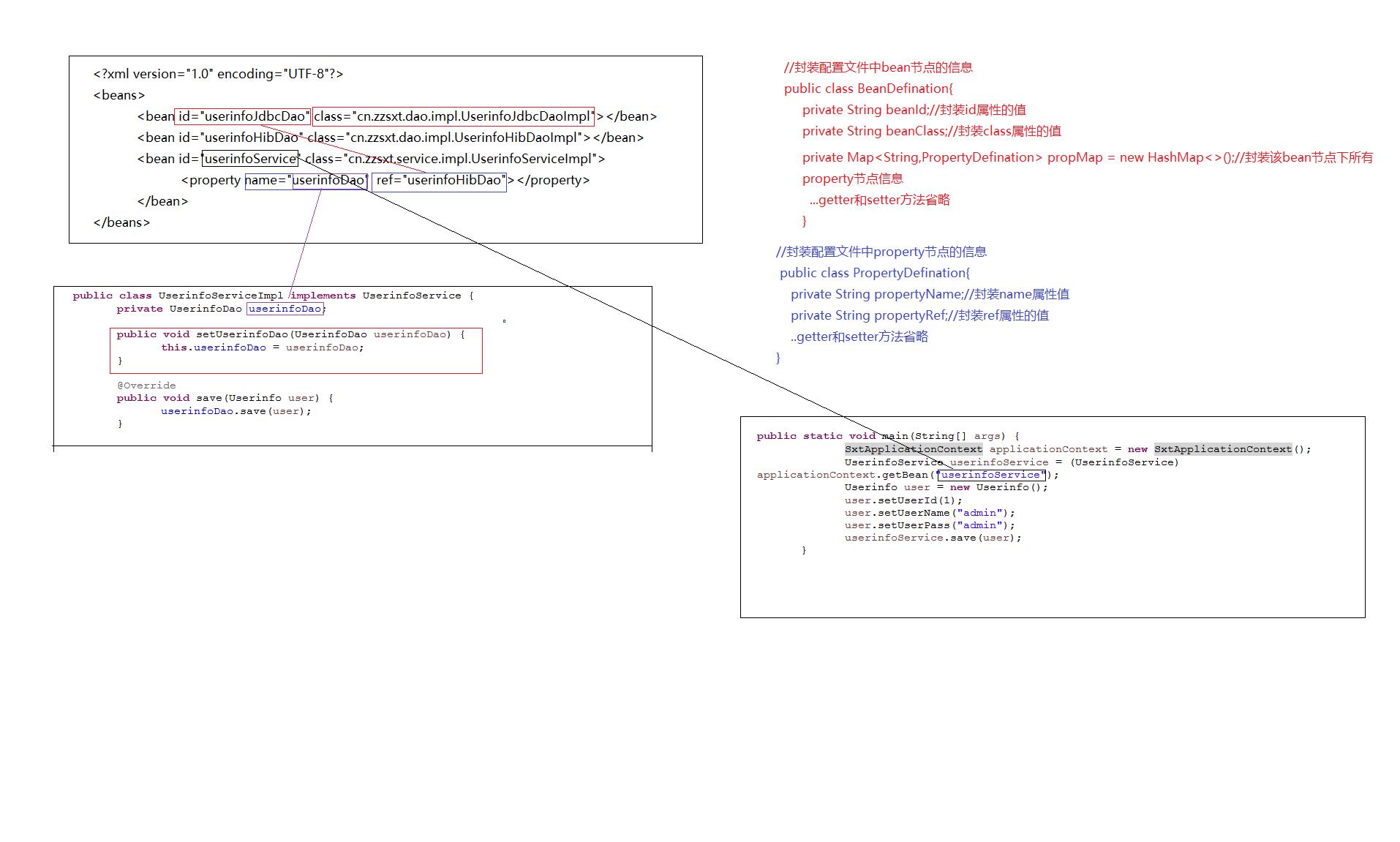
1.基本配置:
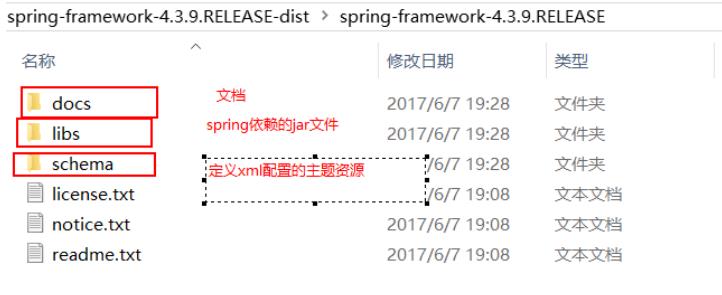
步骤一:新建项目并添加spring依赖的jar文件和commons-logging.xx.jar:
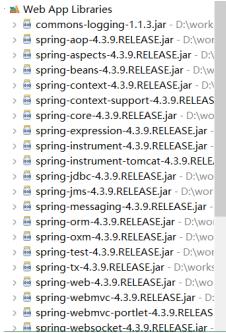
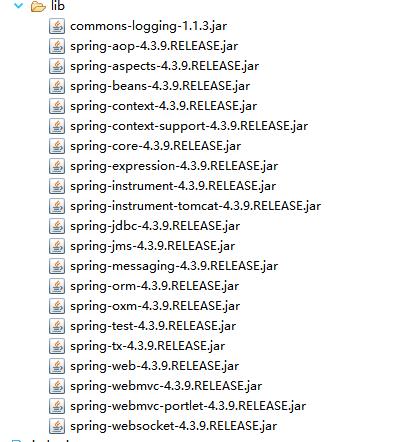
步骤二:编写实体类,DAO及其实现类,Service及其实现类;
步骤三:在src下新建配置文件applicationContext.xml,并配置bean节点和property:
<?xml version="1.0" encoding="UTF-8"?> <beans xmlns="http://www.springframework.org/schema/beans" xmlns:xsi="http://www.w3.org/2001/XMLSchema-instance" xmlns:context="http://www.springframework.org/schema/context" xsi:schemaLocation=" http://www.springframework.org/schema/beans http://www.springframework.org/schema/beans/spring-beans.xsd http://www.springframework.org/schema/context http://www.springframework.org/schema/context/spring-context.xsd"> <bean id="userinfoJdbcDao" class="cn.zzsxt.dao.impl.UserinfoJdbcDaoImpl"></bean> <bean id="userinfoHibDao" class="cn.zzsxt.dao.impl.UserinfoHibDaoImpl"></bean> <bean id="userinfoService" class="cn.zzsxt.service.impl.UserinfoServiceImpl"> <property name="userinfoDao" ref="userinfoHibDao"></property> </bean> </beans>
bean节点:
id属性:用户自定义的bean的名称,使用ApplicationContext中getBean()根据此id的值从spring容器中获取已创建好的对象。
class属性:全限定的类名,spring容器会根据此类名动态创建对象
property节点:
name属性:必须与bean中待注入的属性名称一致,回调其对应的setter方法为该属性赋值。
ref属性:必须与待注入的对象的id一致,从spring容器中根据ref获取待注入的对象,然后回调setter方法将该对象赋值给属性。
步骤四:测试:
public class Test { public static void main(String[] args) { ApplicationContext applicationContext = new ClassPathXmlApplicationContext("applicationContext.xml"); UserinfoService userinfoService = applicationContext.getBean(UserinfoService.class,"userinfoService"); Userinfo user = new Userinfo(); user.setUserId(1); user.setUserName("test"); user.setUserPass("test"); userinfoService.save(user); } }
2.简单基础代码模拟实现:
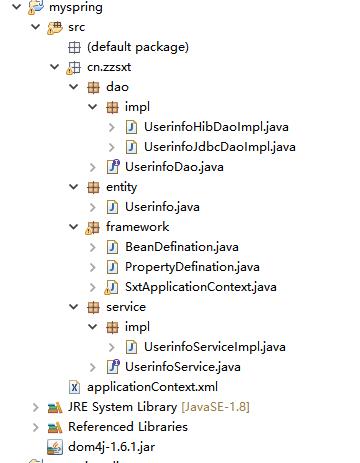
application.xml:
<?xml version="1.0" encoding="UTF-8"?>
<beans>
<!-- UserinfoJdbcDaoImpl userinfoJdbcDao = new UserinfoJdbcDaoImpl()-->
<bean id="userinfoJdbcDao" class="cn.zzsxt.dao.impl.UserinfoJdbcDaoImpl"></bean>
<!--UserinfoHibDaoImpl userinfoHibDao = new UserinfoHibDaoImpl()-->
<bean id="userinfoHibDao" class="cn.zzsxt.dao.impl.UserinfoHibDaoImpl"></bean>
<!--UserinfoServiceImpl userinfoService = new UserinfoServiceImpl() -->
<bean id="userinfoService" class="cn.zzsxt.service.impl.UserinfoServiceImpl">
<!--userinfoService.setUserinfoDao(userinfoJdbcDao); -->
<property name="userinfoDao" ref="userinfoJdbcDao"></property>
</bean>
</beans>
UserinfoHibDaoImpl:
package cn.zzsxt.dao.impl; import cn.zzsxt.dao.UserinfoDao; import cn.zzsxt.entity.Userinfo; public class UserinfoHibDaoImpl implements UserinfoDao { @Override public void save(Userinfo user) { System.out.println("利用hibernate执行了新增,新增用户"+user); } }
UserinfoJdbcDaoImpl:
package cn.zzsxt.dao.impl; import cn.zzsxt.dao.UserinfoDao; import cn.zzsxt.entity.Userinfo; public class UserinfoJdbcDaoImpl implements UserinfoDao { @Override public void save(Userinfo user) { System.out.println("利用jdbc执行了新增,新增用户"+user); } }
BeanDefination:
package cn.zzsxt.framework; import java.util.HashMap; import java.util.Map; /** * 封装配置文件applicationContext.xml中bean节点的信息 * <bean id="userinfoService" class="cn.zzsxt.service.impl.UserinfoServiceImpl"> * <property name="userinfoDao" ref="userinfoHibDao"></property> * </bean> * @author Think * */ public class BeanDefination { private String beanId;//封装id属性的值 private String beanClass;//封装class属性的值 //封装该bean节点的所有property子节点的信息,利用property的name做键,利用property的信息做值 private Map<String,PropertyDefination> propsMap = new HashMap<String,PropertyDefination>(); public String getBeanId() { return beanId; } public void setBeanId(String beanId) { this.beanId = beanId; } public String getBeanClass() { return beanClass; } public void setBeanClass(String beanClass) { this.beanClass = beanClass; } public Map<String, PropertyDefination> getPropsMap() { return propsMap; } public void setPropsMap(Map<String, PropertyDefination> propsMap) { this.propsMap = propsMap; } @Override public String toString() { return "BeanDefination [beanId=" + beanId + ", beanClass=" + beanClass + ", propsMap=" + propsMap + "]"; } }
PropertyDefination:
package cn.zzsxt.framework; /** * 封装applicationContext.xml中property节点的信息 * <property name="userinfoDao" ref="userinfoHibDao"></property> * @author Think * */ public class PropertyDefination { private String propertyName;//封装name属性的值 private String propertyRef;//封装ref属性的值 public String getPropertyName() { return propertyName; } public void setPropertyName(String propertyName) { this.propertyName = propertyName; } public String getPropertyRef() { return propertyRef; } public void setPropertyRef(String propertyRef) { this.propertyRef = propertyRef; } @Override public String toString() { return "PropertyDefination [propertyName=" + propertyName + ", propertyRef=" + propertyRef + "]"; } }
UserinfoServiceImpl:
package cn.zzsxt.service.impl; import cn.zzsxt.dao.UserinfoDao; import cn.zzsxt.entity.Userinfo; import cn.zzsxt.service.UserinfoService; public class UserinfoServiceImpl implements UserinfoService { private UserinfoDao userinfoDao; public void setUserinfoDao(UserinfoDao userinfoDao) { this.userinfoDao = userinfoDao; } @Override public void save(Userinfo user) { userinfoDao.save(user); } }
SxtApplicationContext:
package cn.zzsxt.framework; import java.io.InputStream; import java.lang.reflect.Method; import java.util.HashMap; import java.util.Iterator; import java.util.Map; import java.util.Map.Entry; import org.dom4j.Document; import org.dom4j.DocumentException; import org.dom4j.Element; import org.dom4j.io.SAXReader; import cn.zzsxt.entity.Userinfo; import cn.zzsxt.service.UserinfoService; public class SxtApplicationContext { //封装所有bean节点的信息,利用bean的id做键,利用bean节点的信息做值 private Map<String,BeanDefination> beanDefinationsMap = new HashMap<String,BeanDefination>(); //封装所有动态创建的对象信息,利用bean的id做键,利用创建的对象做值 private Map<String,Object> beansMap = new HashMap<String,Object>(); public SxtApplicationContext(){ parseXML();//解析配置文件 createObject();//动态创建对象 injectObject();//为属性注入值:回调该属性的setter方法 } /** * 解析applicationContext.xml配置文件信息。 * 将bean节点封装成BeanDefination对象 * 将property节点封装成PropertyDefination对象 * */ public void parseXML(){ InputStream ips = this.getClass().getResourceAsStream("/applicationContext.xml"); SAXReader saxReader = new SAXReader(); try { Document document = saxReader.read(ips); //获取根节点 Element beans = document.getRootElement();//获取根节点-->beans节点 Iterator<Element> beanIter = beans.elementIterator(); while(beanIter.hasNext()){ Element bean = beanIter.next();//获取bean节点 String beanId = bean.attributeValue("id");//获取bean节点的id属性值 String beanClass = bean.attributeValue("class");//获取bean节点的class属性值 //将bean节点的信息封装成BeanDefination对象 BeanDefination beanDefination = new BeanDefination(); beanDefination.setBeanId(beanId); beanDefination.setBeanClass(beanClass); Iterator<Element> propertyIter = bean.elementIterator(); while(propertyIter.hasNext()){ Element property = propertyIter.next();//获取property节点 String propertyName = property.attributeValue("name");//获取property节点的name属性值 String propertyRef = property.attributeValue("ref");//获取property节点的ref属性值 //将property节点的信息封装成PropertyDefination对象 PropertyDefination propertyDefination = new PropertyDefination(); propertyDefination.setPropertyName(propertyName); propertyDefination.setPropertyRef(propertyRef); //将property节点的信息添加到beanDefination的map中 beanDefination.getPropsMap().put(propertyName, propertyDefination); } //将beanDefination添加到beanDefinationsMap中 beanDefinationsMap.put(beanId, beanDefination); } } catch (DocumentException e) { e.printStackTrace(); } } /** * 根据配置文件中bean节点的class属性信息动态创建对象,并将创建的对象添加到beansMap中 */ public void createObject(){ try { //1.遍历beanDefinationsMap(封装了所有bean节点的信息) for (Entry<String,BeanDefination> beanEntry :beanDefinationsMap.entrySet()) { String beanId = beanEntry.getKey();//bean的id属性的值 BeanDefination beanDefination = beanEntry.getValue();//获取bean节点的信息 String beanClass = beanDefination.getBeanClass();//bean的class属性的值 Object object = Class.forName(beanClass).newInstance();//根据bean节点的class属性值(全限定的类名)动态创建对象 //将创建的对象添加到beansMap中,利用beanId做键,利用对象做值 beansMap.put(beanId, object); } } catch (Exception e) { e.printStackTrace(); } } /** * 根据property节点所配置的属性信息,从容器中查找待注入的对象,回调setter方法为属性赋值。 */ public void injectObject(){ try { for (Entry<String,BeanDefination> beanEntry :beanDefinationsMap.entrySet()) { String beanId = beanEntry.getKey();//bean的id属性的值 //根据beanId从beansMap中创建的对象 Object target=getBean(beanId); BeanDefination beanDefination = beanEntry.getValue();//获取bean节点的信息 String beanClass = beanDefination.getBeanClass();//bean的class属性的值 Class clazz = Class.forName(beanClass);//动态加载bean Map<String,PropertyDefination> propsMap = beanDefination.getPropsMap();//获取property节点的信息 for (Entry<String,PropertyDefination> propertyEntry : propsMap.entrySet()) { PropertyDefination propertyDefination = propertyEntry.getValue();//获取property节点的信息 String propertyName = propertyDefination.getPropertyName();//获取property的name属性值 String propertyRef = propertyDefination.getPropertyRef();//获取property的ref属性值 Object params = getBean(propertyRef);//根据property中的ref属性值从beansMap获取待注入的对象(要求ref属性的值必须与待注入的bean的id值一致) String setterMethodName = makeSetter(propertyName);//根据property节点的name属性值,获取其对应的setter方法名 Method[] ms = clazz.getDeclaredMethods(); for (Method method : ms) { String methodName = method.getName(); if(methodName.equals(setterMethodName)){ //回调setter方法 method.invoke(target, params); } } } } } catch (Exception e) { e.printStackTrace(); } } /** * 根据beanId从beansMap容器中获取创建的对象 * @param beanId * @return */ public Object getBean(String beanId){ return beansMap.get(beanId); } /** * 根据属性名称生成对应的setter方法名: set+属性的首字母大写+其余字母 * @param fieldName * @return */ public String makeSetter(String fieldName){ return "set"+fieldName.substring(0,1).toUpperCase()+fieldName.substring(1); } public static void main(String[] args) { SxtApplicationContext applicationContext = new SxtApplicationContext(); UserinfoService userinfoService = (UserinfoService)applicationContext.getBean("userinfoService"); Userinfo user = new Userinfo(); user.setUserId(1); user.setUserName("admin"); user.setUserPass("admin"); userinfoService.save(user); } }
3.spring注入(DI):
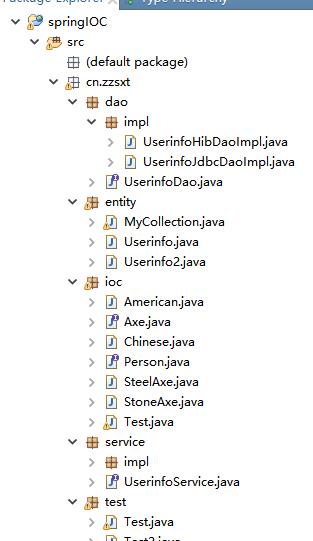
application.xml:
<?xml version="1.0" encoding="UTF-8"?> <beans xmlns="http://www.springframework.org/schema/beans" xmlns:xsi="http://www.w3.org/2001/XMLSchema-instance" xmlns:context="http://www.springframework.org/schema/context" xsi:schemaLocation=" http://www.springframework.org/schema/beans http://www.springframework.org/schema/beans/spring-beans.xsd http://www.springframework.org/schema/context http://www.springframework.org/schema/context/spring-context.xsd"> <bean id="userinfoJdbcDao" class="cn.zzsxt.dao.impl.UserinfoJdbcDaoImpl"></bean> <bean id="userinfoHibDao" class="cn.zzsxt.dao.impl.UserinfoHibDaoImpl"></bean> <bean id="userinfoService" class="cn.zzsxt.service.impl.UserinfoServiceImpl"> <property name="userinfoDao" ref="userinfoHibDao"></property> </bean> </beans>
beans.xml:
<?xml version="1.0" encoding="UTF-8"?> <beans xmlns="http://www.springframework.org/schema/beans" xmlns:xsi="http://www.w3.org/2001/XMLSchema-instance" xmlns:context="http://www.springframework.org/schema/context" xsi:schemaLocation=" http://www.springframework.org/schema/beans http://www.springframework.org/schema/beans/spring-beans.xsd http://www.springframework.org/schema/context http://www.springframework.org/schema/context/spring-context.xsd"> <!-- DI:依赖注入 1.setter注入:回调属性的setter方法为该属性赋值 a.为属性注入常量值:使用property的value属性 b.为属性注入对象:使用property的ref属性 2.构造方法注入(构造子注入):回调构造方法为属性赋值 --> <bean id="user" class="cn.zzsxt.entity.Userinfo"> <property name="userId" value="1"></property> <property name="userName" value="zhangsan"></property> <property name="userPass" value="123"></property> </bean> <!-- 构造方法注入:constructor-arg index代表的参数的下标 a.为属性注入常量值:使用constructor-arg中的value属性 b.为属性注入对象: 使用constructor-arg中的ref属性 --> <bean id="user2" class="cn.zzsxt.entity.Userinfo2"> <constructor-arg index="0" value="2"></constructor-arg> <constructor-arg index="1" value="lisi"></constructor-arg> <constructor-arg index="2" value="1234"></constructor-arg> </bean> <bean id="userinfoJdbcDao" class="cn.zzsxt.dao.impl.UserinfoJdbcDaoImpl"></bean> <bean id="userinfoService" class="cn.zzsxt.service.impl.UserinfoServiceImpl"> <!-- 使用setter注入 --> <!-- <property name="userinfoDao" ref="userinfoJdbcDao"></property> --> <!-- 使用构造函数为属性注入对象 --> <constructor-arg index="0" ref="userinfoJdbcDao"></constructor-arg> </bean> </beans>
beans2.xml:
<?xml version="1.0" encoding="UTF-8"?> <beans xmlns="http://www.springframework.org/schema/beans" xmlns:xsi="http://www.w3.org/2001/XMLSchema-instance" xmlns:context="http://www.springframework.org/schema/context" xsi:schemaLocation=" http://www.springframework.org/schema/beans http://www.springframework.org/schema/beans/spring-beans.xsd http://www.springframework.org/schema/context http://www.springframework.org/schema/context/spring-context.xsd"> <!-- 为集合属性注入值:在框架的集成中较为常见 --> <bean id="myCollection" class="cn.zzsxt.entity.MyCollection"> <!-- 为list类型的属性注入值 --> <property name="list"> <list> <value>list1</value> <value>list2</value> <value>list3</value> </list> </property> <!-- 为set类型的属性注入值 --> <property name="set"> <set> <value>set1</value> <value>set2</value> <value>set1</value> </set> </property> <!-- 为map类型的属性注入值 --> <property name="map"> <map> <entry key="key1" value="value1"></entry> <entry key="key2" value="value2"></entry> </map> </property> <!-- 为properties类型的属性注入值 --> <property name="props"> <props> <prop key="p-key1">p-value1</prop> <prop key="p-key2">p-value2</prop> </props> </property> </bean> </beans>
beans3.xml:
<?xml version="1.0" encoding="UTF-8"?> <beans xmlns="http://www.springframework.org/schema/beans" xmlns:xsi="http://www.w3.org/2001/XMLSchema-instance" xmlns:context="http://www.springframework.org/schema/context" xsi:schemaLocation=" http://www.springframework.org/schema/beans http://www.springframework.org/schema/beans/spring-beans.xsd http://www.springframework.org/schema/context http://www.springframework.org/schema/context/spring-context.xsd"> <bean id="stoneAxe" class="cn.zzsxt.ioc.StoneAxe"></bean> <bean id="steelAxe" class="cn.zzsxt.ioc.SteelAxe"></bean> <bean id="chinese" class="cn.zzsxt.ioc.Chinese"> <property name="axe" ref="stoneAxe"></property> </bean> <bean id="american" class="cn.zzsxt.ioc.American"> <property name="axe" ref="steelAxe"></property> </bean> </beans>
MyCollection:
package cn.zzsxt.entity; import java.util.List; import java.util.Map; import java.util.Properties; import java.util.Set; public class MyCollection { private List list; private Set set; private Map map; private Properties props; 以上是关于java:Spring框架1(基本配置,简单基础代码实现)的主要内容,如果未能解决你的问题,请参考以下文章